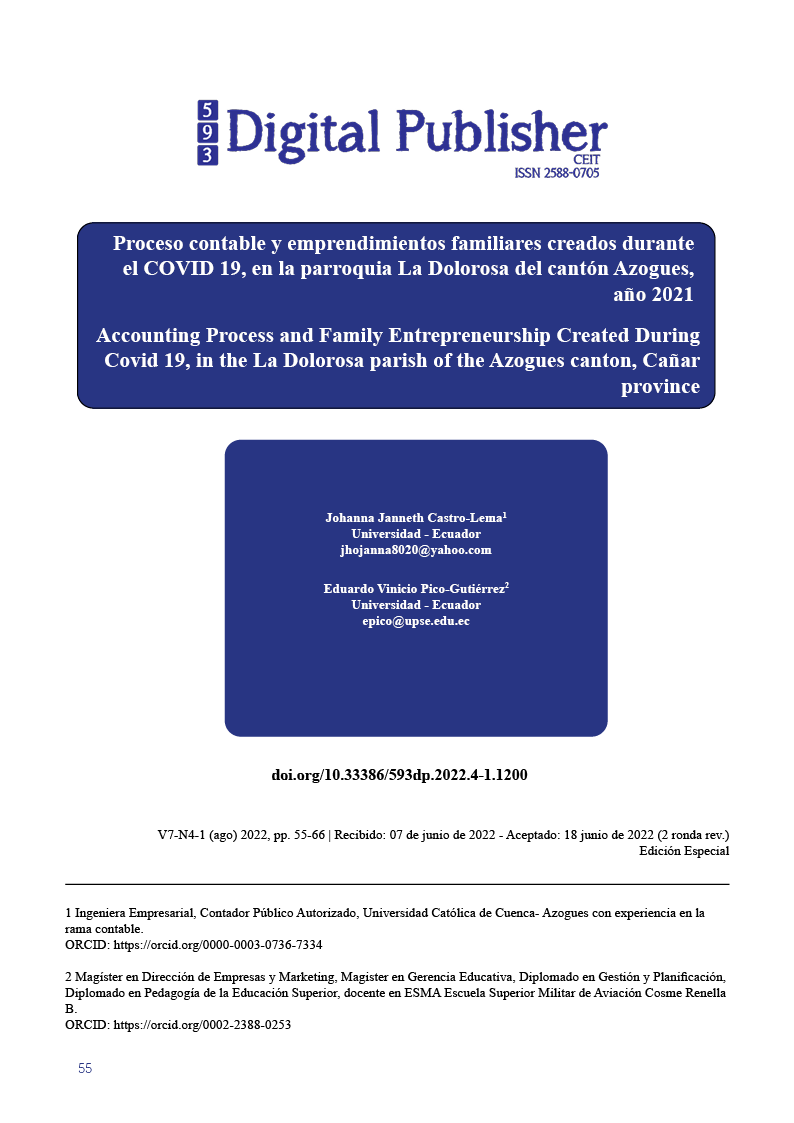Accounting Process and Family Entrepreneurship Created During Covid 19, in the La Dolorosa parish of the Azogues canton, Cañar province
Main Article Content
Abstract
This research work focuses on analyzing the accounting process for the proper functioning of family businesses, created in the Covid-19 pandemic, in the Azogues canton, Cañar Province. It should be noted that business accounting is necessary for any business model, since it will allow them to exercise control and make the necessary decisions to achieve the proposed results. For data collection, the survey technique was applied to 200 inhabitants of the family entrepreneurs, through a questionnaire created in the web application Google Forms. After the information was collected, the respective tabulation and analysis of the surveys was carried out. In order to know the knowledge that the entrepreneurs have about accounting, the inductive method of research work was used for the development of the concepts by breaking them down into their parts, which allowed identifying the deficient knowledge of the entrepreneurs about the general rules and management of the accounting record of their business, since this will allow knowing the possible scenarios and the feasibility that the family businesses work and improve their economic income; having financial and operational sense. The basic accounting structure, including the recording of daily transactions, is the most important contribution of this study since it helps the entrepreneur to have a broader understanding of the company's controls.
Downloads
Article Details

This work is licensed under a Creative Commons Attribution-NonCommercial-ShareAlike 4.0 International License.
1. Derechos de autor
Las obras que se publican en 593 Digital Publisher CEIT están sujetas a los siguientes términos:
1.1. 593 Digital Publisher CEIT, conserva los derechos patrimoniales (copyright) de las obras publicadas, favorece y permite la reutilización de las mismas bajo la licencia Licencia Creative Commons 4.0 de Reconocimiento-NoComercial-CompartirIgual 4.0, por lo cual se pueden copiar, usar, difundir, transmitir y exponer públicamente, siempre que:
1.1.a. Se cite la autoría y fuente original de su publicación (revista, editorial, URL).
1.1.b. No se usen para fines comerciales u onerosos.
1.1.c. Se mencione la existencia y especificaciones de esta licencia de uso.
References
Abiti Maldonado, M., & Ocejo Fernández, X. (2004). La sucesion de poder en la empresa familiar: análisis de dos casos. Universidad de las Américas, Pueblas, México.
Auqui, A. (2018). EL PROCESO CONTABLE Y SU INCIDENCIA EN LA RENTABILIDAD EN COMERCIAL “ULLOA”, DE LA CIUDAD DE RIOBAMBA, PERÍODO 2015.
Duarte, T., & Ruiz, T. (2009). EMPRENDIMIENTO, UNA OPCIÓN PARA EL DESARROLLO. Scientia Et Technica, XV(0122–1701), 326–331.
Enriquez, C. (15 de julio de 2020). 3,6 millones de personas emprendieron en Ecuador en el 2019. Líderes. Obtenido de https://www.revistalideres.ec/lideres/millones-personas-emprendieron-ecuador-estudio.html
González, E., & Olivié, C. (2018). Empresa familiar, emprendimiento e intraemprendimiento.
Gonzalo Rivas, C. S. (Junio de 2020). Respuesta al COVID-19, la ciencia la innovacion y el desrrollo productivo. Obtenido de https://publications.iadb.org/publications/spanish/document/Respuestas-al-COVID-19-desde-la-ciencia-la-innovacion-y-el-desarrollo-productivo.pdf
Granda, M., & de la Calle, R. (2020). Las empresas familiares en Ecuador y América Latinay su respuesta ante el Covid-19.
Gutama, M., & Jiménez, P. (2019). El emprendimiento y su evolución como una alternativa laboral en el contexto latinoamericano: una revisión de literatura.
Ley orgánica de emprendimiento e innovación. (21 de Febrero de 2020). Articulo 1. Obtenido de https://www.gob.ec/sites/default/files/regulations/2020-03/Documento_LEY-ORGANICA-EMPRENDIMIENTO-INNOVACION.pdf
Martins, N. (17 de Abril de 2020). Oberlo. Obtenido de ¿Qué es el emprendimiento? Definición y significado de emprendedor y emprendimiento: https://www.oberlo.es/blog/definicion-y-significado-emprendimiento
Mileman, M., & Sibanda, S. (2016). EGISTROS CONTABLES.
Olivero, E., & Campo, L. (Diciembre d 2018). Emprendimiento e innovación como motor del desarrollo sostenible. Revista de Ciencias Sociales. Obtenido de https://dialnet.unirioja.es/servlet/articulo?Codigo=7025267 Pompa. (2016).
Posso, M. L. (2000). El protocolo en las empresas de propiedad familiar. Obtenido de Estudios Gerenciales : http://www.scielo.org.co/scielo.php?script=sci_arttext&pid=S0123-59232000000100002#:~:text=%C2%BFQu%C3%A9%20es%3F,direcci%C3%B3n%20a%20los%20negocios%20familiares.
Rodríguez, J. M. (2018). Elementos clave para definir el concepto de utilidad en la información financiera. Actualidad Contable FACES, 21, 136–150.
Sánchez. (11 de Junio de 2017). Innovacion Empresarial. Obtenido de https://www.mheducation.es/bcv/guide/capitulo/8448614224.pdf



